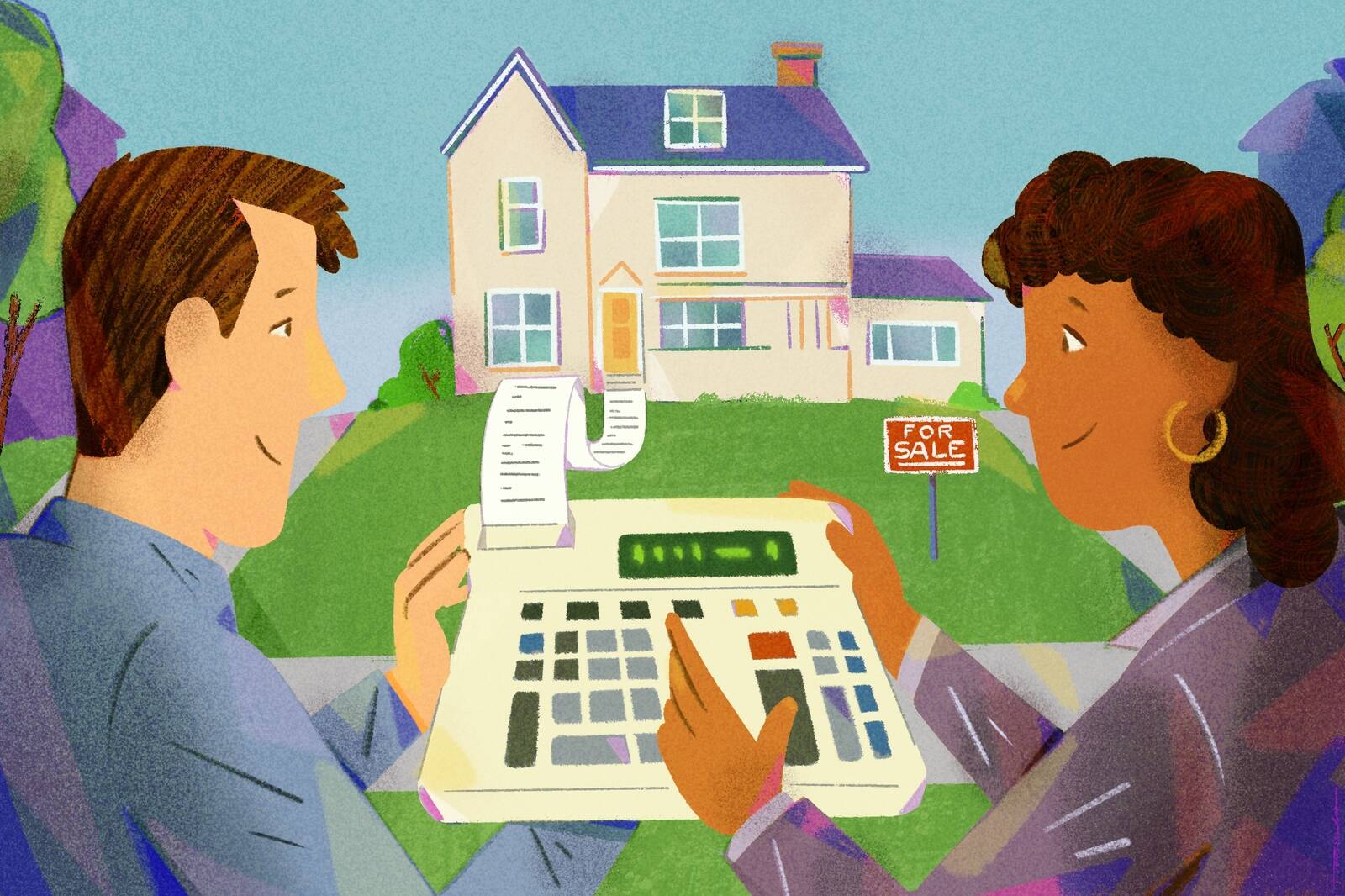Finance & Accounting Sep 5, 2025
Ready to Buy a House? Beware the Online Calculators.
Affordability and rent-vs-buy tools are easy to use but can be misleading. Here’s a holistic approach to making your decision.

Jesús Escudero
Are you ready to buy a house?
Online home-affordability calculators and rent-vs-buy tools are staples of the process for first-time homebuyers. Enter a set of assumptions about your finances into a form, and within seconds it will produce a figure for how much house you can afford or a verdict on whether you would be better off renting or buying.
These tools are simple and convenient. Yet they can also be misleading for those making home-purchasing decisions.
Craig Furfine, a clinical professor of finance at the Kellogg School, says these tools fall far short of providing real financial guidance. In a paper published in July, he argues they are not just limited but seriously flawed in how they inform first-time homebuyers.
“What these tools don’t speak to is how a home purchase fits into the optimal financial plan for the individuals contemplating buying a house,” Furfine says.
Furfine describes what aspiring homebuyers can do to take a more-holistic approach to their decision—one that accounts for what he calls the “sizing” as well as the “timing” of their purchase.
The trouble with affordability calculators
Home affordability calculators are typically framed as tools that inform the consumer: enter your salary, debt load, down payment, and interest rate and the calculator will return with a figure for the maximum home price you can afford.
But those numbers only reflect the level of risk banks may be comfortable assuming, not what makes sense for the buyer’s finances.
“It’s really not how much home you, the homebuyer, can afford,” Furfine says. “It’s really an answer of what a lender will be willing to lend you. It should be called a Lender Willingness Calculator.”
For example, his paper notes that home-affordability calculators are calibrated to assume it’s fine to spend up to 28 percent of your monthly income on housing costs alone and up to 36 percent when you include all your other debts. Those limits, Furfine says, are set to protect the bank against losses, not to ensure that you can meet other financial goals.
“This is among the most consequential financial decisions a person can make, but following the guidance of an affordability calculator is outsourcing your financial planning to a bank,” he says. “The lender doesn’t care that you save for your children’s college education or early retirement. They just want the mortgage repaid.”
His paper notes that by focusing solely on what you can borrow, these tools leave out vital questions: How do you want to live? How early do you want to retire? Do you plan to support children through college? Do you travel frequently or live simply?
“Every dollar you spend on your house is a dollar that you can’t put towards achieving every other goal that you’ll ever have in your lifetime,” Furfine says. “And I don’t think an online tool will ever be able to address that question for you.”
“Everybody is conceivably at risk of over-leveraging, over-borrowing, and paying more for a house than a strategic financial plan would suggest. Because again, those tools were designed to protect the lender, not to protect the homeowner.”
How rent-vs-buy calculators fall short
Another popular tool—rent-vs-buy calculators—aim to show which option will leave you wealthier over time. But, as Furfine notes, these comparisons can be misleading when they don’t look at the cost of renting and buying the same property.
“You can’t compare the rent that you’re paying now with the mortgage that you are contemplating getting because you’re inevitably getting two different products,” Furfine says. “If you are renting a two-bedroom apartment and you’re pricing out buying a three-bedroom home that comes with a backyard, even in the same neighborhood, they’re different products.”
“It’s up to you to decide: How do I allocate my lifetime’s wealth between my house and my lifestyle and everything that’s not the house? No tool online will ever be able to answer that.”
—
Craig Furfine
Unless you’re comparing renting the exact property you’re thinking of buying, it’s an apples-to-oranges exercise. Even in the case of two very comparable properties—two-bedroom condos in the same downtown high rise—the rent-vs-buy calculator is not likely to tell you much.
“If you do a cashflow analysis using the numbers on identical properties in the same building, there’s a good chance the results will lead you to be indifferent between buying and renting,” Furfine says. “If it was cheaper to buy, people would buy. And if it was cheaper to rent, people would rent. This conclusion tends to be dissatisfying to people, but it follows naturally wherever housing markets are reasonably efficient.”
How risk fits into the homebuying decision
Even when buyers make more thorough comparisons, Furfine says they often miss a deeper problem: buying and renting involve very different risks.
People who rent often say that it’s the right decision because they can invest what would have been their house down payment into the stock market.
“If I ask you, ‘What’s worth more, $100,000 worth of stock or $100,000 worth of home?’ The answer is, they’re both worth the same,” Furfine says. “A pound of feathers is the same weight as a pound of lead.”
Yet those two investments behave differently. Stock markets may be volatile, but most people invest without borrowing money to do it. Real estate, on the other hand, is typically purchased with a large amount of debt.
“Your leveraged investment into the house might in fact be riskier than the $100,000 in the stock market,” Furfine says. That is why, if your calculation shows that an increase to your home’s value builds up your equity more quickly, “I wouldn’t be surprised—it’s because you took greater risk.”
Borrowing magnifies both gains and losses: if the home’s value rises, your return on the cash you invested grows faster. But if it falls, your losses grow faster too.
Rethinking when to buy
Even when there’s not a calculator or tool involved, data can mislead prospective homebuyers on another front: when to buy.
Many homebuyers look at a variety of external factors—from interest rates to housing availability in their dream neighborhood—to strike at the most opportune time.
Furfine thinks this approach may not be terribly effective, especially if you’re buying a house to live in for five years or more. If you expect to stay in your home for a while, then trying to divine whether it’s a good time to buy may not even be the right question.
“Housing markets, like many other things, go through cycles. You buy it at some part in the cycle; you’re going to sell it at some other part in the cycle. In practice, most homebuyers are not good market forecasters, and so you ought not be worried about those sorts of things.”
In other words, short-term price fluctuations shouldn’t drive your decision. That said, certain market conditions can still tilt the scales. As Furfine notes, high interest rates on home loans might actually create opportunity.
“When interest rates are high, it may be a better time to buy a home, because fewer people are standing by on the sidelines,” he says. With many buyers deterred by higher mortgage rates, competition drops, prices can soften, and sellers may be more open to negotiation. The result, Furfine says, is that “you might get a good deal on the house, and you may be able to refinance into a lower rate later.”
Aligning ambitions with financial goals
Forget whether the house is a good deal or if the bank signs off on the mortgage. As Furfine puts it, the question you should be asking when approaching home ownership is this: What kind of lifestyle do you want to lead and which financial goals are you hoping to achieve, other than homeownership?
“It’s up to you to decide: How do I allocate my lifetime’s wealth between my house and my lifestyle and everything that’s not the house?” Furfine says. “No tool online will ever be able to answer that.”
Once you commit to the process of homebuying, Furfine recommends setting aside online calculators for a different formula. Start by projecting your lifetime income, then subtract your goals—retirement, college, lifestyle—and see what’s left for a home. This process is more involved than plugging income numbers into an online calculator, but it better aligns your ambitions with your long-term financial goals.
Online tools can still serve a purpose, Furfine adds, but only if used with an understanding of what they do—and what they don’t do.
“Financial decisions—especially the biggest ones, like buying a home—are not really those that you can make by using off-the-shelf calculations. They require careful financial planning and an honest assessment of your goals,” Furfine says. “And that is something no simple online tool can do for you.”
Seb Murray is a writer based in London, United Kingdom.



